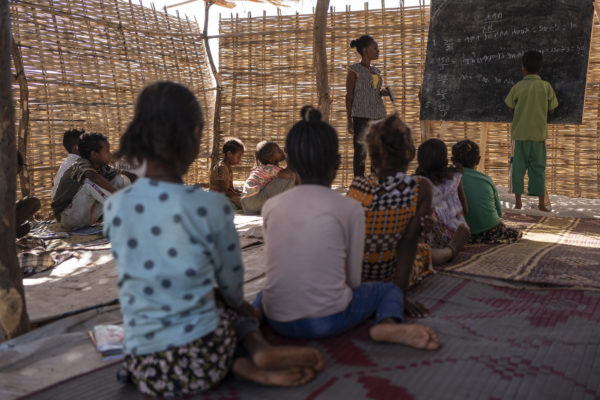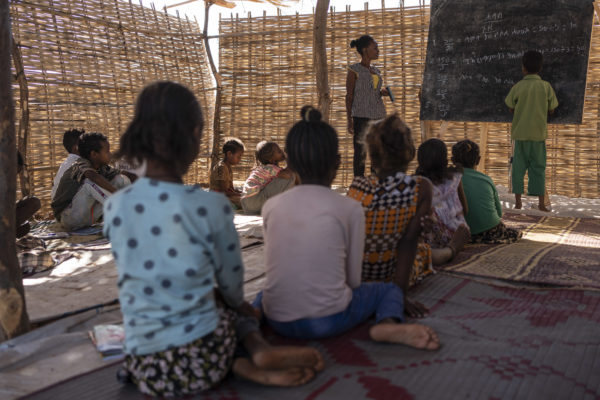Church Massacre, Food Shortages Reported as Ethiopian Civil War Continues to Rage In Tigray Region
The Horn of Africa continues to be enflamed by violence amid a military crisis in northern Ethiopia’s Tigray region.
For the past two and a half months, war has breached the relative disquiet of Ethiopia, rousing instability throughout several nations in Africa’s northeast. United Nations officials estimate the fighting has forced 2.2 million people to flee their homes. Civilians continue to either be recruited by warring factions or targeted with violence. Unconfirmed reports of armed conflict, mass killings, artillery strikes, unsanctioned executions, widespread looting and other human rights violations continue to trickle out of Tigray from refugees who manage to escape the war-torn region.

There have also been reports of ethnic cleansing, including recent news that hundreds of people were gunned down outside a church.
Tigray has been a war zone since Nov. 4. Troops from Tigray People’s Liberation Front (TPLF), the region’s ruling political party, stormed and seized control of the Northern Command, a federal army base in the regional capital Mekelle.
Prime Minister Abiy Ahmed called it a crossing of “the last red line” and ordered a military offensive. Since then, the Ethiopian National Defense Force has been battling an uprising from Tigray’s “junta” rebel forces.
Abiy declared victory on Nov. 28, telling the world his army had regained “full command” of Mekelle and the final phase of his military operation was complete.
But humanitarian workers say the fighting continues and hundreds of thousands have yet to receive assistance because aid efforts are still constrained. The United Nations High Commissioner for Refugees, the U.N’s refugee agency, estimates children make up nearly a third of those seeking asylum from Tigray.
“Refugees are arriving with little more than the clothes on their backs, fatigued and in weak conditions,” UNHCR spokesperson Andrej Mahecic said in a statement last week.
Tigray remains very much in a volatile state, according to a Jan. 9 situational report from the Europe External Programme with Africa. EEPA confirmed that a church was attacked in Aksum, a historical tourist town in Tigray. Reportedly, 750 people hiding in the church were forced out and shot on the square in front of the cathedral on Jan. 8.
The report did not indicate who carried out the atrocity.
Much of the fighting has moved to the region’s mountainous countryside on the outskirts of Mekelle. But the capital city continues to be a hotbed of violence with people being prevented from leaving.
On Thursday, Jan. 14, U.N. High Commissioner of Refugees Filippo Grandi said some refugees who reach the national capital, Addis Ababa, are being turned away and returned to Mekelle. Some of them are forced back against their will, he said.
Meanwhile, there are reports that Eritrean soldiers have joined forces with Ethiopian federal troops and are participating in war efforts near the Ethiopian-Sudan border. Some have reportedly tried to disguise themselves by wearing Ethiopian military uniforms.
Eritreans escaping trouble in their homeland have sought refuge in Ethiopia for decades. Nearly 100,000 Eritreans were living in asylum on four refugee camps in Mekelle when the Tigray war erupted.
Grandi said the UNHCR remains “extremely troubled” by the plight of Eritrean refugees. Thousands continue to flee the camps searching for safety, and many have arrived to nearby towns emaciated and begging for aid.
Bloomberg reported that eight satellite images from Planet Labs Inc, a San Francisco-based imaging company, seemed to indicate destruction of two Eritrean refugee camps in Tigray. A storage facility, school and health care compound have been burned down this month in Shimelba, a sanctuary for about 8,000 refugees. Less than 20 miles away, the aerial images showed dozens of burned structures on the Hitsats camp, which provides shelter for 25,000 Eritreans.
Reuters reports Ethiopian army officials this weekend claimed the national military killed 15 ranking TPLF members and captured eight others. Among those taken prisoner were Sebhat Nega, one of the party’s founding members, and Abay Weldu, who served as Tigray’s president from 2010 to 2018.
A government task force announcement from Wednesday said three TPLF members, including ex-Ethiopian Foreign Minister Seyoum Mesfin, were killed when they refused to surrender to military forces.

